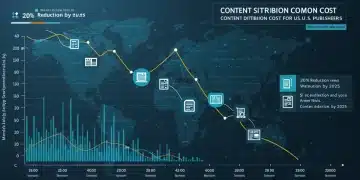News Tokenization: Revolutionizing Citizen Journalism in the US

News tokenization offers a groundbreaking method to incentivize citizen journalism in the US through tokenized rewards for content creation, verification, and distribution, potentially disrupting traditional media models by fostering a more participatory and decentralized news ecosystem.
The media landscape in the United States is undergoing a significant transformation, driven by technological advancements and shifting consumption habits. Among the emerging trends is **news tokenization: analyzing the potential of tokenized incentives for citizen journalism in the US**. This innovative approach leverages blockchain technology to revolutionize how news is created, distributed, and consumed, particularly within the realm of citizen journalism.
Understanding News Tokenization
News tokenization involves creating digital tokens that represent ownership or participation in a news ecosystem. These tokens can be used to reward citizen journalists for their contributions, incentivize content verification, and facilitate the distribution of news in a decentralized manner. This new model has the potential to disrupt traditional media outlets and empower individuals to become active participants in the news creation process.
The Basics of Tokenization
Tokenization, in its simplest form, is the process of converting something into a digital token that can be traded or used on a blockchain. In the context of news, this could mean creating tokens that represent articles, videos, or even the work of individual journalists. These tokens can then be used to reward contributions, incentivize participation, and create new economic models for news production.
Benefits of News Tokenization
The benefits of news tokenization are multifaceted. For citizen journalists, it offers a new way to monetize their work and gain recognition for their contributions. For consumers, it provides access to a wider range of news sources and allows them to directly support the journalists and publications they value. For the industry as a whole, it fosters greater transparency, accountability, and innovation.
- Provides new revenue streams for citizen journalists.
- Enhances the credibility of news through tokenized verification mechanisms.
- Creates more democratic and participatory news ecosystems.
- Stimulates innovation in news creation and distribution models.
News tokenization is a transformative approach that aligns incentives within the news ecosystem, fostering a more participatory, transparent, and economically sustainable model for citizen journalism.
The Rise of Citizen Journalism in the US
Citizen journalism has grown substantially in the US, thanks to smartphones, social media, and the increasing accessibility of online platforms. This trend empowers ordinary individuals to report on local events, share unique perspectives, and hold power accountable. News tokenization can significantly enhance citizen journalism by providing a financial incentive and a means to build trust and reputation.
Impact of Technology on Citizen Journalism
Technology has always played a crucial role in the expansion of citizen journalism. The advent of smartphones equipped with high-quality cameras and internet connectivity has enabled individuals to capture and share news in real-time. Social media platforms have further amplified the reach of citizen journalists, allowing them to bypass traditional media gatekeepers and connect directly with audiences.
Challenges Faced by Citizen Journalists
Despite its potential, citizen journalism faces several challenges. One of the most significant is the lack of financial resources. Unlike professional journalists, citizen journalists often lack the funding and support necessary to conduct in-depth investigations or cover breaking news events. This financial constraint can limit their ability to produce high-quality content and sustain their efforts over time.

News tokenization addresses key issues in citizen journalism by providing digital incentives, reinforcing reliability and independence, and promoting innovative news distribution methods.
Tokenized Incentives: A New Model for Citizen Journalism
Tokenized incentives offer a compelling solution to the financial challenges faced by citizen journalists. By rewarding content creation, verification, and distribution with digital tokens, this model creates a sustainable ecosystem where citizen journalists can earn a living while producing high-quality news. This approach not only empowers individual journalists but also fosters a more diverse and participatory media landscape.
How Tokenized Incentives Work
The basic premise of tokenized incentives is simple: citizen journalists are rewarded with tokens for their contributions to the news ecosystem. These tokens can be earned by creating original content, verifying the accuracy of news stories, or even simply sharing news on social media. The tokens can then be exchanged for other cryptocurrencies or fiat currency, providing citizen journalists with a tangible financial reward for their efforts.
Examples of Successful Tokenized News Platforms
Several platforms are already experimenting with tokenized news models. These platforms are using tokens to reward content creators, incentivize verification, and create new economic models for news production. While these platforms are still in their early stages, they offer a glimpse into the potential of tokenized incentives to transform the news landscape.
- Civil: A blockchain-based journalism platform that aims to create a more sustainable and trustworthy news ecosystem.
- Steemit: A social media platform that rewards users with cryptocurrency for creating and curating content.
- Publish0x: A crypto-agnostic publishing platform where authors and readers earn crypto.
By implementing tokenized incentives, citizen journalists can overcome financial limitations, create sustainable models, and contribute to a more inclusive news ecosystem.
Analyzing the Potential Impact on the US Media Landscape
News tokenization offers a transformative solution that has the potential to reshape the US media landscape. By incentivizing citizen journalists to actively engage in credible reporting, encouraging independent voices, and fostering greater transparency, tokenization can contribute to a more diverse and reliable news environment.
Increased Diversity of News Sources
One of the most significant impacts of news tokenization is the potential to increase the diversity of news sources. By lowering the barriers to entry for citizen journalists, it can empower individuals from diverse backgrounds and communities to share their stories and perspectives. This increased diversity can lead to a more nuanced and comprehensive understanding of issues facing the US.
Enhanced Trust and Transparency
News tokenization addresses issues of trust and transparency in media by using blockchain to establish reliable content and reward journalists, therefore increasing consumer trust and participation in the industry.

Tokenization can promote a more open, reliable, and varied media ecosystem that reflects modern society’s complexities and ensures a more democratic news environment.
Challenges and Considerations for News Tokenization
While news tokenization offers many potential advantages, it also faces several challenges and considerations. These include regulatory uncertainty, scalability issues, and the potential for manipulation. Addressing these challenges will be essential to ensure that news tokenization is implemented in a responsible and sustainable manner.
Regulatory Uncertainty
The regulatory landscape for cryptocurrencies and blockchain technology is still evolving, and this uncertainty can pose a challenge for news tokenization platforms. It is important for these platforms to carefully consider the legal and regulatory implications of their activities and to comply with all applicable laws and regulations.
Scalability Issues
Blockchain technology can be slow and expensive, which can make it difficult to scale news tokenization platforms. As the number of users and transactions increases, the platform may become congested, leading to delays and higher transaction fees. Addressing these scalability issues will be essential to ensure that news tokenization can be adopted more widely.
Success requires solving legal problems, scaling capacity, avoiding manipulation, and prioritizing user-friendliness and ethical norms.
The Future of Citizen Journalism with Tokenized Incentives
The future of citizen journalism in the US is likely to be heavily influenced by news tokenization. As blockchain technology matures and regulatory clarity emerges, tokenized incentives are poised to become an increasingly important tool for empowering citizen journalists, fostering greater trust and transparency, and diversifying the news landscape. This evolution will create new opportunities for individuals to participate in the news creation process and contribute to a more informed and engaged society.
Embracing New Technologies
The successful integration of news tokenization will depend on embracing new technologies and adapting to the evolving needs of the media landscape. This includes exploring new blockchain platforms, developing innovative incentive mechanisms, and leveraging artificial intelligence to combat misinformation and verify the accuracy of news stories.
Collaborating Across Sectors
Collaboration across sectors will be essential to realize the full potential of news tokenization. This includes partnerships between citizen journalists, media organizations, technology companies, and regulatory bodies. By working together, these stakeholders can create a more sustainable, transparent, and participatory news ecosystem that benefits everyone.
Combining new tech, collaboration, and education can elevate credibility, fairness, and engagement in citizen journalism, leading to a more transparent and inclusive media ecosystem.
| Key Point | Brief Description |
|---|---|
| 💰 Tokenized Rewards | Incentives for citizen journalists through digital tokens. |
| 📱 Citizen Journalism | Individuals reporting and sharing news using technology. |
| 🌐 Decentralization | Shifting news creation and distribution away from traditional media. |
| ✅ Verification | Using tokens to ensure accuracy and reliability of news. |
FAQ
News tokenization involves creating digital tokens to represent participation in a news ecosystem, rewarding contributions and incentivizing content verification.
It allows citizen journalists to monetize their work and receive recognition for their contributions through digital rewards.
Challenges include regulatory uncertainty, scalability issues, and the potential for manipulation, requiring careful management and compliance.
Platforms like Civil, Steemit, and Publish0x are experimenting with tokenized models, incentivizing content creation and verification.
Tokenization lowers entry barriers, enabling diverse voices and perspectives, leading to a more nuanced understanding of issues.
Conclusion
In conclusion, **news tokenization: analyzing the potential of tokenized incentives for citizen journalism in the US** presents a paradigm shift in how news is created, verified, and consumed. By leveraging blockchain technology and tokenized incentives, this innovative approach empowers citizen journalists, fosters greater transparency, and promotes a more diverse and participatory media landscape, offering a promising path toward a more informed and engaged society.





